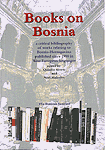
|
 |
 |
Selected Longer Reviews
Memoirs
|
By Hurd, Douglas
|
Little, Brown, London,
2003,
544 pages,
Shelf mark: 941.85'092 [B]
|
No apologies for Bosnia
by Vernon Bogdanor
Douglas Hurd, Memoirs, Little Brown, London 2003, £20, 544 pages
These memoirs, Douglas Hurd tells us, ‘come into the world late’. The three premiers under whom he served - Edward Heath, Margaret Thatcher and John Major - produced their own accounts some time ago. Memoirs tells the story of a life rather than the history of a succession of Tory administrations. The consequence, however, is a book that is unbalanced. Its author does not reach the Cabinet until halfway through the book. Bosnia, the crux of Hurd's tenure of the Foreign Office, occupies just 32 pages, less than half the space devoted to his spell as a junior diplomat.
Hurd impinged on the wider public consciousness when, during the Tory leadership contest of 1990, he sought to rebut the accusation that his patrician background rendered him unfit to govern modern Britain. Not so, he replied. His father was but a tenant farmer with just 450 acres. He was at Eton on a scholarship and had spent his school holidays planting potatoes to earn pocket money. He was now reduced to just 10 acres. This explanation, unsurprisingly, did not convince. It was, as Hurd admits, a mistake.
Still, he is right to say that he is not a patrician but comes from the squirearchy and the professional middle classes who created the modern Tory party. His hereditary instincts were reinforced by his lecturers at Cambridge - two baleful Tory historians, Herbert Butterfield and Kitson Clark. They told him that there was a Tory alternative to the Whig interpretation of history. It is never clear what this amounted to. Tory history, Macaulay used to insist, was but a celebration of the liberal achievements of a previous generation.
The Tory squires retained their political ascendancy by drawing other classes into government. Their creed was appeasement - which, as Hurd notes, used to be a term of praise. Indeed, Oxford historian A.J.P. Taylor once said, not wholly mischievously, that appeasement was the noblest term in the diplomatic vocabulary.
Like the squires, Douglas Hurd was in politics to make things work, undistracted by fanciful ideas or Utopian sentiments. Often described as a liberal in penal affairs, he is at pains to disown the epithet. For him the penal system was ‘just one part of the wall of protection of the citizen against crime. Whenever the wall was shown to be crumbling it was my job to repair it, without spending much time considering the philosophy of the repair work’.
The Queen's government must be carried on and outside critics, when not activated by malice or misplaced enthusiasm, invariably oversimplify. Indeed, even when, as with Bosnia, they turn out to be right, they display only the wisdom of hindsight, not the solid sense of the mature statesman.
Appeasement works best in a community unified by common values and with some sense of mutuality. In Northern Ireland, Hurd fought hard to create these values by bringing the Catholic minority within the fold of the political community. As Home Secretary he put great weight - too much, he now concedes - on Neighbourhood Watch schemes, while calling for the return of the active citizen. All this was sensible, if unspectacular.
It was a different story when Hurd became Foreign Secretary in 1990. The old geopolitical doctrines of Tory realism had little to offer in the world of Milosevic or al-Qaeda, of ethnic cleansing and the suicide bomber. In the Balkans, there was not a semblance of a community or settled order between states. Hurd faced what his successor Malcolm Rifkind was to acknowledge as the worst crimes in Europe since the Holocaust. His insistence on an arms embargo prevented Bosnia from exercising her right of self-defence against massacre and rape. Lifting the embargo, Hurd said, would create a ‘level killing field’; but, as Margaret Thatcher pointed out, there already was a ‘killing field the like of which I thought we would never see in Europe again - it is in Europe's sphere of influence. It should be in Europe's sphere of conscience’. Hurd misleads when he states that the second Srebrenica massacre, the biggest war crime in Europe since 1945, occurred after he left the Foreign Office, implying that he bore no responsibility. He resigned from the government on July 5 1995: the massacre occurred just a few days later.
UN Secretary-General Kofi Annan has apologised on behalf of the international community for the policy of ‘amoral equivalency’ in the Balkans, which equated victims and aggressors. Hurd offers only feeble excuses. His political opponents, he pleads, supported him in favouring the arms embargo, and there was no popular movement against it. Yet leaders are supposed to educate opinion, not follow it; and public opinion was in fact way ahead of the government: in April 1993, more than two-thirds of those polled by Mori supported the dispatch of British troops, while in February 1994, more than half wanted air strikes against the Bosnian Serbs.
Lenin once said that H.G. Wells was a good man fallen among Fabians. Douglas Hurd is a good man fallen among realists. ‘More than any country,’ Hurd minuted to his prime minister during the Bosnian crisis, ‘we have been the realists.’ Memoirs may be read as a cautionary tale for all those who believe that realism in international affairs is enough and that whate'er is best administered is best.
Vernon Bogdanor is Professor of Government at Oxford University. This review appeared in The Financial Times (London), 15 November 2003
Back to Books on Bosnia

|
|
 |

Books on
Bosnia:A database of 379 book reviews and 3741 books held by the Institute:
|
|